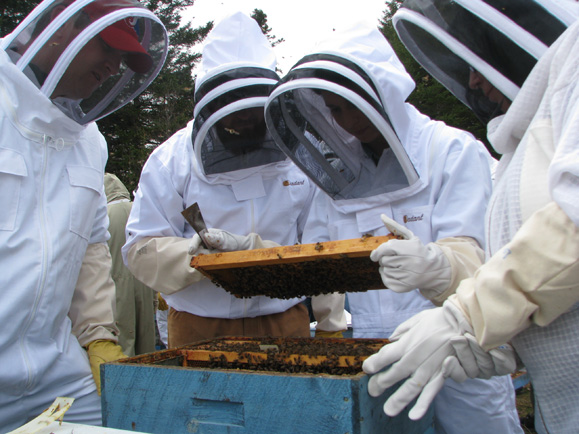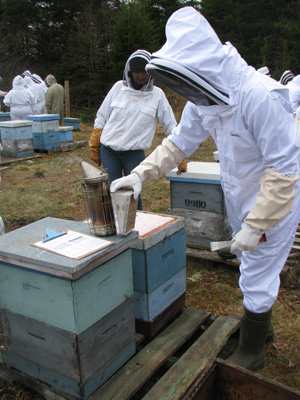News
» Go to news mainExtended Learning abuzz at the Faculty of Agriculture
The needs of the agriculture industry are always changing. From health and safety, technology and development and much more, new opportunities and challenges are always arising in the industry. With these changing needs come the demand for new and improved courses and programs to adapt to these changes.
 Extended Learning at Dalhousie University Faculty of Agriculture aims to help industry, especially across Atlantic Canada, adapt to these often complex changes. They offer credit and non-credit certificate programs, short courses and workshops that meet the needs of the agriculture industry. With courses that are available through distance education at various training locations and on campus, Extended Learning focuses on flexibility and innovation in reaching learners.
Extended Learning at Dalhousie University Faculty of Agriculture aims to help industry, especially across Atlantic Canada, adapt to these often complex changes. They offer credit and non-credit certificate programs, short courses and workshops that meet the needs of the agriculture industry. With courses that are available through distance education at various training locations and on campus, Extended Learning focuses on flexibility and innovation in reaching learners.
“Extended Learning is demand driven,” says Sarah Macdonald, Manager of Extended Learning. “We offer courses that industry wants and needs, and that will have impact at the farm level. We are right in the hub of agricultural training; our faculty, instructors, researchers and facilities are all important contributors to quality training initiatives. We use specialized expertise to contribute to sustainable and healthy communities.”
One challenge that the agriculture industry is recently facing is the decline in the number of insects pollinating crops such as apples and wild blueberries. Although many wild bees are hard at work transferring pollen from flower to flower in these crops, the sizes of these crops means that beekeepers need to move thousands of managed honey bees into the fields. While honey bees have suffered high winter losses over the past decade, skilled beekeepers have largely managed to make up these losses during the spring and summer. The major drivers of these losses are thought to be complex and interacting and include the fact that agricultural landscapes are more thoroughly managed and honey bees face new pest and disease problems. The consequence has been that honey bees have become more intensively managed. Forty years ago, a Nova Scotia beekeeper could leave their colonies in one place earn their living from the honey they collected. Today, the majority of beekeepers have to prepare their colonies for an early season move to pollinate crops, then back again to help the colonies recover. These new challenges require new, modernized beekeeping skills.
 Seeking a solution to the issue, Extended Learning at Dal AC paired with interdisciplinary PhD candidate, Andony Melathopoulos of Dalhousie University’s School for Resource and Environmental Studies. Andony has worked closely with Dr. Chris Cutler, Associate Professor with the Department of Environmental Sciences at Dal Faculty of Agriculture, to conduct extensive research on honeybees and wild blueberry pollination.
Seeking a solution to the issue, Extended Learning at Dal AC paired with interdisciplinary PhD candidate, Andony Melathopoulos of Dalhousie University’s School for Resource and Environmental Studies. Andony has worked closely with Dr. Chris Cutler, Associate Professor with the Department of Environmental Sciences at Dal Faculty of Agriculture, to conduct extensive research on honeybees and wild blueberry pollination.
“I am primarily interested in how bees help blueberry growers increase their yields,” Andony says. “I worked for a decade as an Apiculture Research Technician with Agriculture and Agri-Food Canada. I saw how beekeepers in Western Canada adapted to changing conditions. Honey bees can be very resilient when beekeepers have the right tools to face new problems and pollination opportunities.”
Andony has also worked closely with local beekeeper Tony Phillips to come up with another solution to the pollinator problem. Tony, a retired teacher and now a successful beekeeper, has previous experience teaching beekeeping. He taught a course on beekeeping through the Community School in Truro Tony is also very involved in the Nova Scotia Beekeepers Association giving him invaluable wisdom and experience with bees.
Together, Extended Learning, Tony and Andony developed a modularized course on beekeeping. The course, called Modern Beekeeper, consists of four modules over four weekends during the year. Each module is seasonally themed. For example, participants learn about what you should be doing in the bee yard at that specific time of year and the work that needs to be done. On June 19 and 20, the course will pick up with its third module. It will focus on the 3P's of Bees: Propagation, Pollination and Products. The first module, The Busyness of Bees, took place on March 28 and 29 while the second module took place May 9 and 10 and looked at Bee Hive and Health. The fourth and final module is scheduled for September 12 and 13 and will focus on Bee Maintenance and Business Growth.
The program lays a foundation of the theory of beekeeping and uses hands-on scenarios in the bee yard to demonstrate how the theories are put into practice. The program teaches participants everything they need to know about bees. From how bees make wax, to managing pests, how to get started and build up your operation, blueberry pollination and business planning, participants will leave the course with vast knowledge on beekeeping.
“The program is important because we need more bees to pollinate some of our most delicious crops, notably blueberry and apples,” Andony explains. “The province really is running short of bees and we are now importing them, at great expense, from as far away as Ontario. There is a lot of opportunity in Nova Scotia to make a living from beekeeping.”
So far, the Modern Beekeeper has been a huge success. In its third season, all of the sessions have reached the maximum number of participants and participants have come from as far away as Quebec, Ontario and Newfoundland to participate.
As for the future? Sarah Macdonald says the Faculty has a leadership role as well, and Extended Learning is considering how to bring more advanced modules to beekeepers once they’ve completed the Modern Beekeeper course.
In addition to Modern Beekeeper, Extended Learning at the Faculty of Agriculture offers many more programs and services to help the agriculture industry thrive. With the number of programs they offer always increasing, Extended Learning at the Faculty of Agriculture is buzzing with anticipation of the exceptional courses and programs they have in store.
Recent News
- 2024 International Society for Research on Emotion
- Fall 2024 Brightspace Course Spaces
- Assistant Registrar ‑ Recruitment, Special Events, and Campus Tours,
- Certificate of Appreciation – Public Health
- Theatre props available
- Transforming Poultry Care with Artificial Intelligence
- New Face on Campus
- Chloe Toombs ‑ Combining agriculture and engineering
